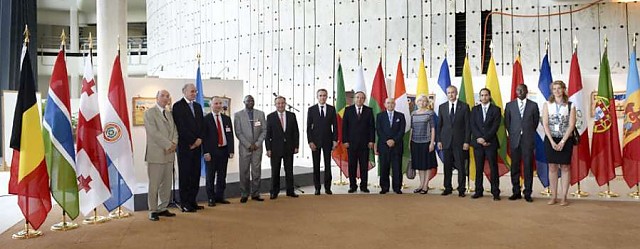Home > Who We Help > Stateless People > Ending Statelessness > State Action on Statelessness
State Action on Statelessness

In December 2011, UNHCR organized a ministerial meeting in Geneva to commemorate the 60th anniversary of the 1951 UN Refugee Convention and the 50th anniversary of the 1961 Convention on the Reduction of Statelessness. The meeting galvanized an unprecedented commitment by governments to take action to address statelessness. A total of 61 countries and one regional body made statelessness-related pledges. This included pledges by 34 states to accede, or to take steps to accede, to one or both of the statelessness conventions.
Pledges were also made by different countries in a number of other areas, including law reform to prevent or reduce statelessness (including removing gender discrimination from their nationality laws); implementation of better civil registration and documentation systems to prevent and reduce statelessness; establishment of statelessness determination procedures; and studies or mapping initiatives to better understand the extent of statelessness in their countries.
Implementation of these pledges will expedite the prevention and reduction of statelessness and improve the identification and protection of stateless people globally.
States which have fulfilled their pledges to date include:
- Turkey (28/03/2015 acceded to the 1954 Convention)
- Peru (18/12/2014 acceded to the 1961 Convention; 23/1/2014 acceded to the 1954 Convention)
- Argentina (13/11/2014, acceded to the 1961 Convention)
- Mozambique (1/10/2014 acceded to both Conventions)
- Colombia (15/08/2014 acceded to the 1961 Convention)
- Guinea (17/07/2014 acceded to the 1961 Convention)
- Belgium (1/7/2014 acceded to the 1961 Convention)
- Gambia (1/7/2014 acceded to both conventions)
- Paraguay (1/0/2014 acceded to the 1954 Convention; 6/6/2012 acceded to the 1961 Convention)
- Côte d’Ivoire (3/10/2013 acceded to both conventions)
- United States of America (2012/2013 focused US diplomacy on preventing and resolving statelessness)
- Senegal (28/6/2013 reformed citizenship law to eliminate gender discrimination in transmission of nationality to children and spouses)
- Ukraine (25/03/2013 acceded to both conventions)
- Philippines (22/10/2012 established a statelessness determination procedure)
- Portugal (01/10/2012 acceded to both conventions)
- Honduras (18/12/2012 acceded to the 1961 Convention; 01/10/2012 acceded to the 1954 Convention)
- Ecuador (24/9/2012 acceded to the 1961 Convention)
- Hungary (5/7/2012 withdrew its reservations to the 1954 Convention)
- Moldova (19/4/2012 acceded to both conventions; 10/2/2012 established a statelessness determination procedure)
- Bulgaria (22/3/2012 acceded to both conventions)
- Georgia (27/6/2012 established a statelessness determination procedure; 23/12/2011 acceded to the 1954 Convention)
- Benin (8/12/2011 acceded to both conventions)
Other significant action taken by States since the ministerial meeting but which was not contained in any pledge:
- Belize (14/8/2015 acceded to the 1961 Convention)
- El Salvador (9/2/2015 acceded to the 1954 Convention)
- Niger (7/11/2014 acceded to the 1954 Convention)
- Georgia (1/7/2014 acceded to the 1961 Convention)
- Montenegro (5/12/2013 acceded to the 1961 Convention)
- Nicaragua (29/7/2013 acceded to the 1961 Convention and 15/7/2013 acceded to the 1954 Convention)
- Lithuania (15/7/2013 acceded to the 1961 Convention)
- Turkmenistan (3/7/2013 reformed nationality law to include additional safeguards against statelessness and 29/8/2012 acceded to the 1961 Convention)
- Jamaica (9/1/2013 acceded to the 1961 Convention)
- Burkina Faso (1/5/2012 acceded to the 1954 Convention)
Progress on Accessions to the Statelessness Conventions

Maps
- States party to the statelessness conventions (as of 1st September 2015)
- States which pledged during the 2011 Ministerial Intergovernment Event on Refugees and Stateless Persons to undertake law reform or to improve access to civil registration or identification documentation to prevent and reduce statelessness(2011)
- States which pledged during the 2011 Ministerial Intergovernment Event on Refugees and Stateless Persons to establish or to take steps to establish statelessness determination procedures (2011)
- States which pledged during the 2011 Ministerial Intergovernment Event on Refugees and Stateless Persons to undertake studies or awareness campaigns in relation to statelessness (2011)


